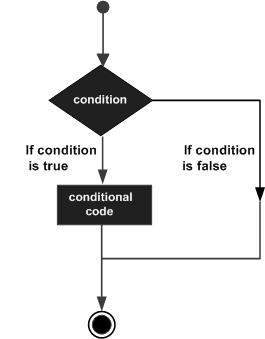- 锈-决策(1)
- R-决策(1)
- F#-决策
- C#-决策
- C#-决策(1)
- R-决策
- C-决策(1)
- F#-决策(1)
- C-决策
- 锈-决策
- Elixir (1)
- Elixir-宏
- Elixir-宏(1)
- Elixir-流(1)
- Elixir-流
- Python决策
- Python决策(1)
- Python 3-决策
- Python 3-决策(1)
- Elixir 列表 - Elixir (1)
- Elixir 列表 - Elixir 代码示例
- elixir 模块 - Elixir (1)
- Elixir 代码示例
- Java-决策
- Java-决策(1)
- Java-决策
- Java-决策(1)
- elixir 模块 - Elixir 代码示例
- Elixir 格式代码 - Elixir (1)
📅 最后修改于: 2020-11-04 08:22:57 🧑 作者: Mango
决策结构要求程序员指定一个或多个要由程序评估或测试的条件,以及确定该条件为true时要执行的一个或多个语句,以及指定该条件时要执行的其他语句(可选)确定为假。
以下是大多数编程语言中常见的典型决策结构的概况-

Elixir像许多其他编程语言一样提供if / else条件构造。它还有一个cond语句,该语句调用找到的第一个真值。 Case是另一个控制流语句,它使用模式匹配来控制程序流。让我们深入了解它们。
Elixir提供以下类型的决策声明。单击以下链接以查看其详细信息。
| Sr.No. | Statement & Description |
|---|---|
| 1 | if statement
An if statement consists of a Boolean expression followed by do, one or more executable statements and finally an end keyword. Code in if statement executes only if Boolean condition evaluates to true. |
| 2 | if..else statement
An if statement can be followed by an optional else statement(within the do..end block), which executes when the Boolean expression is false. |
| 3 | unless statement
An unless statement has the same body as an if statement. The code within unless statement executes only when the condition specified is false. |
| 4 | unless..else statement
An unless..else statement has the same body as an if..else statement. The code within unless statement executes only when the condition specified is false. |
| 5 | cond
A cond statement is used where we want to execute code on basis of several conditions. It kind of works like an if…else if….else construct in several other programming languages. |
| 6 | case
Case statement can be considered as a replacement for switch statement in imperative languages. Case takes a variable/literal and applies pattern matching to it with different cases. If any case matches, Elixir executes code associated with that case and exits case statement. |